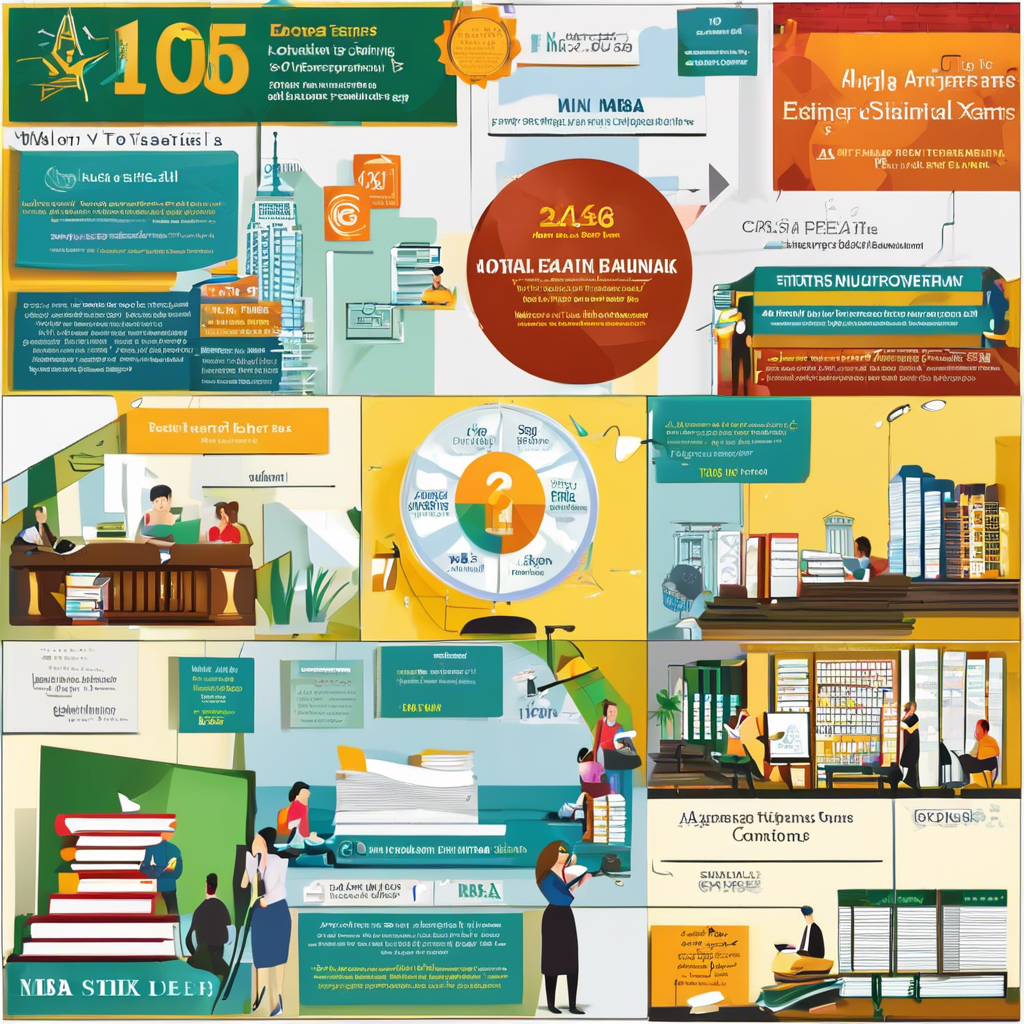When aspiring to pursue a Master of Business Administration (MBA) degree, one of the key steps in the application process is taking the entrance exams required by various business schools. These exams play a crucial role in determining a candidate’s eligibility and readiness for a rigorous MBA program. In this article, we will explore some of the top MBA entrance exams that are widely recognized and accepted by prestigious business schools around the world.
1. **GMAT (Graduate Management Admission Test)** – The GMAT is one of the most popular and widely accepted exams for MBA admissions. It assesses a candidate’s analytical, quantitative, verbal, and reading skills. Many top business schools, including Harvard Business School and Stanford Graduate School of Business, require GMAT scores as part of their admission criteria.
2. **GRE (Graduate Record Examination)** – While traditionally used for a wide range of graduate programs, the GRE is also accepted by many business schools as an alternative to the GMAT. The GRE assesses a candidate’s analytical writing, verbal reasoning, and quantitative reasoning skills.
3. **CAT (Common Admission Test)** – In India, the CAT is a highly competitive exam used by the Indian Institutes of Management (IIMs) and other top business schools for their MBA programs. The CAT assesses a candidate’s quantitative ability, data interpretation, verbal ability, and logical reasoning skills.
4. **MAT (Management Aptitude Test)** – The MAT is another popular entrance exam for MBA programs in India. It assesses a candidate’s language comprehension, mathematical skills, data analysis, and critical reasoning abilities. Many business schools in India accept MAT scores for their admissions process.
5. **XAT (Xavier Aptitude Test)** – Conducted by XLRI Jamshedpur, the XAT is another prominent MBA entrance exam in India. It assesses a candidate’s quantitative ability, English language skills, decision-making ability, and general knowledge.
6. **NMAT (NMIMS Management Aptitude Test)** – The NMAT is conducted by the Graduate Management Admission Council (GMAC) and is accepted by NMIMS University and other business schools in India. It assesses a candidate’s language skills, quantitative skills, and logical reasoning abilities.
7. **CMAT (Common Management Admission Test)** – The CMAT is a national-level entrance exam in India conducted by the National Testing Agency (NTA). It assesses a candidate’s quantitative techniques, data interpretation, language comprehension, and logical reasoning skills.
8. **SNAP (Symbiosis National Aptitude Test)** – The SNAP exam is conducted by Symbiosis International University for admission to its MBA programs. It assesses a candidate’s general English, analytical and logical reasoning, quantitative, and data interpretation skills.
9. **IIFT (Indian Institute of Foreign Trade)** – The IIFT entrance exam is conducted by the Indian Institute of Foreign Trade for admission to its MBA (International Business) program. It assesses a candidate’s quantitative ability, logical reasoning, and proficiency in English.
10. **MICAT (MICA Admission Test)** – The MICAT is conducted by MICA, Ahmedabad for admission to its PGDM-C program. It assesses a candidate’s analytical and logical thinking, written communication, general awareness, and divergent thinking skills.
11. **ATMA (AIMS Test for Management Admissions)** – The ATMA is a national-level entrance exam in India conducted by the Association of Indian Management Schools (AIMS). It assesses a candidate’s verbal reasoning, numerical reasoning, and analytical reasoning abilities.
12. **TISSNET (Tata Institute of Social Sciences National Entrance Test)** – The TISSNET is conducted by the Tata Institute of Social Sciences for admission to its various management programs. It assesses a candidate’s general awareness, analytical ability, and English proficiency.
13. **IBSAT (ICFAI Business School Aptitude Test)** – The IBSAT is conducted by the ICFAI Business School for admission to its MBA and PGPM programs. It assesses a candidate’s quantitative ability, data interpretation, vocabulary, and reading comprehension skills.
14. **IRMA (Institute of Rural Management Anand)** – The IRMA entrance exam is conducted by the Institute of Rural Management Anand for admission to its PGDRM program. It assesses a candidate’s analytical reasoning, quantitative aptitude, verbal ability, and issues of social concern.
15. **MAH MBA CET (Maharashtra MBA Common Entrance Test)** – The MAH MBA CET is a state-level entrance exam conducted by the State Common Entrance Test Cell, Maharashtra for admission to MBA/MMS programs in Maharashtra. It assesses a candidate’s logical and abstract reasoning, quantitative aptitude, and verbal ability.
16. **KMAT (Karnataka Management Aptitude Test)** – The KMAT is a state-level entrance exam conducted by the Karnataka Private Post Graduate Colleges Association for admission to MBA and PGDM programs in Karnataka. It assesses a candidate’s verbal ability and reading comprehension, quantitative ability, and logical reasoning.
17. **PUCAT (Punjab University Common Aptitude Test)** – The PUCAT is conducted by Punjab University for admission to its MBA program. It assesses a candidate’s verbal ability, quantitative ability, and general knowledge.
18. **TSICET (Telangana State Integrated Common Entrance Test)** – The TSICET is a state-level entrance exam conducted by Kakatiya University, Warangal on behalf of Telangana State Council of Higher Education for admission to MBA programs in Telangana. It assesses a candidate’s mathematical ability, communication ability, and problem-solving skills.
In conclusion, choosing the right MBA entrance exam is crucial for aspiring business professionals seeking admission to top business schools. Each exam assesses different skills and abilities, so it is important for candidates to carefully evaluate their strengths and weaknesses before selecting an exam to prepare for. By understanding the requirements of various MBA entrance exams and preparing diligently, candidates can enhance their chances of securing admission to their dream business school and embarking on a successful career in the field of business administration.
